12 Nov 2014 | Draw the Line, Young Writers / Artists Programme
The right to vote has long been a symbol that you are seen as a valuable and worthy citizen by your government. The removal of this right is a restriction on your free expression and your ability to contribute to change in your country. But is restricting our right to vote a violation of free speech?
In the recent United States midterm elections there was controversy over the Republican’s use of voting restrictions to prevent groups — who they assumed would vote Democrat — from access to the polling station. The voter ID “fraud” laws have been accused by liberals as a shady measure to attempt to reduce voting by racial and ethnic minorities. It would also affect young people who lacked the supposedly necessary identification.
Voting age is another example of an ongoing debate surrounding this issue. Sixteen-year-olds were allowed to vote in the Scottish referendum earlier this year. Since then, people have questioned whether the voting age should be reduced to 16 for the upcoming UK general election, and whether sixteen year olds are capable of making a well informed decision. And if voting is an act of free speech, does this mean prisoners should have the opportunity to vote? If voting is truly a human right should we all have the right to vote?
This article was posted on 12 November at indexoncensorship.org
7 Aug 2014 | Europe and Central Asia, News and features, Turkey

Turkish Prime Minister Recep Tayyip Erdogan (Photo: Philip Janek / Demotix)
Shortly before campaigning for Turkey’s upcoming presidential election was officially set to begin, the director of public broadcaster TRT threatened to cut coverage of candidate Selahattin Demirtas. The reason? Demirtas had publicly criticised TRT for bias towards one of the three men in the running — outgoing Prime Minister Recep Tayyip Erdogan.
The case, reported by Index on Censorship’s media freedom mapping tool, is just one example of the challenges facing free expression in Turkey on eve of a vote that could alter its political system. When Turks go to the polls on Sunday, it will be in the country’s first direct presidential election. The consensus is that Erdogan will beat his opponents — Dermitas from the left wing People’s Democratic Party and Ekmeleddin Ihsanoglu, representing the centre-left Republican People’s Party and the far-right Nationalist Movement Party — comfortably; some predict after just one round. But what makes this election even more significant, is Erdogan’s declared intention to transform the presidency from a largely ceremonial role to a powerful office based on the US model. This would effectively allow him to remain in power despite being barred from re-election as prime minister by term limits.
Concerns have been raised about the impact of the state of free expression in Turkey on the election. The Organisation for Security and Cooperation in Europe (OSCE), in its capacity as an election observer, recently stated that “direct interference of media owners and political actors into editorial freedom results in a lack of independent and investigative journalism and leads to limited criticism towards the ruling party and the prime minister”. The interim report from its election observation mission published on 31 July, also highlighted shortcomings in the legal framework around impartiality of media coverage and the the country’s restrictive internet legislation.
This is at least in part backed up by Demirtas’ claims. According to research from Turkey’s broadcasting regulator, between 4 and 6 July, TRT gave 533 minutes worth of coverage to Erdogan, compared to 3.24 seconds for Ihsanoglu and 45 seconds to Demirtas. Erdogan has also been accused of blurring the lines between his role as prime minister and presidential candidate, and using resources and platforms exclusively available to him to rally support. The campaigns of Erdogan’s opponents “have been active, but with limited visibility”, as the OSCE put it.
Other recent media freedom cases go beyond questions of impartiality. Released just days before the election, a report by Bianet, a Turkish news site that monitors attacks on press freedom, showed that assaults on journalists is on the rise. As covered by Index, the research found that between April and June, there had been 54 attacks on journalists — between January and March, the figure was “at least” 40. The report also noted that 133 fines were handed out to various TV and radio institutions and continued impunity around attacks on the media. This follows the pattern of Turkey’s global press freedom ranking, which has deteriorated over the past years.
Internet freedom has also been dealt some blows in the lead-up to the election. The latest Twitter transparency report, published last week, showed that Turkey has submitted the highest number of content removal requests in the past six months — despite the fact that Twitter was banned in Turkey for two weeks in March and April. The social media platform has been used by many of the country’s 36 million internet users to have their say on political matters, most notably during last summer’s Gezi park protests — a topic Turkish playwright Meltem Arikan has written about extensively for Index.
More recently, Turkish social media was flooded with photos of grinning women, in protest at Deputy Prime Minister Bulent Arinc declaring that women shouldn’t laugh out loud in public. While the bans on Twitter and later also YouTube were short-lived, authorities continue to keep close tabs on the internet. Twitter user @fuatavni, who has almost one million followers, was blocked in Turkey after criticising the government. Earlier in July, Erdogan filed a legal complaint against the editor of Today’s Zaman, Bulent Kenes, over what he claimed were insulting tweets. This comes in the wake of controversial legislation passed in February, which gives the government wide-reaching powers in regulating the internet.
More about Turkey from mediafreedom.ushahidi.com:
Newspaper Agos, film director threatened on Twitter
News crew told to leave public event attended by minister
Greek daily newspaper in Istanbul closes
Broadcaster threatens to stop covering presidential candidate
Prime Minister files legal complainst against newspaper editor
This article was published on August 7, 2014 at indexoncensorship.org
1 Nov 2013 | Azerbaijan, Azerbaijan News, Europe and Central Asia, News and features
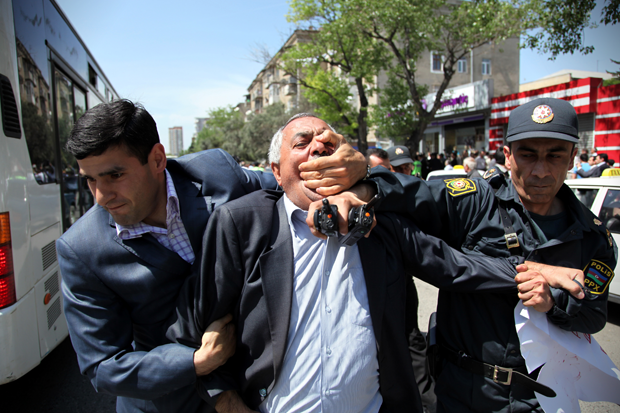
Narimanov Park, Baku, 15 May 2010. Police forcibly detain a political activist during an unsanctioned protest. Photograph by Abbas Atilay
Press release from the Institute for Reporters’ Freedom and Safety (IRFS)
Azerbaijan’s government has unleashed a massive crackdown on the civil society and media in the wake of the October presidential election, the Institute for Reporters’ Freedom and Safety (IRFS) said today.
A group of police investigators yesterday raided the office of the Election Monitoring and Democracy Studies Centre (EMDSC), the independent election watchdog that enraged the government by reporting irregularities surrounding the Azerbaijan’s election.
The raid began around 11:00 am yesterday in Azerbaijan’s capital, Baku and lasted for five hours. Computers and documents were seized. The Prosecutor General’s Office launched investigation “regarding irregularities recorded at the Election Monitoring and Democracy Studies Centre”.
The raid on the election watchdog NGO signalled a sharp and very serious escalation of the country’s deepening human rights and political crisis. “It’s a clear message to the government’s critics: ‘Don’t get involved in any issues that question legitimacy of the presidential election”, IRFS CEO and chairman Emin Huseynov said.
“The Election Monitoring and Democracy Studies Centre’s work for free and fair elections contributed to the implementation of Azerbaijan’s international commitments notably within the Council of Europe and the OSCE. The authorities must recognise this work and immediately stop harassment of the organisation”, Huseynov said.
IRFS believes that the government is conducting a carefully coordinated witch hunt aimed at discrediting critics of the government, and particularly those active in the election period.
In a separate case, one of the most vocal critics of the government, a Baku-based opposition newspaper Azadliq faces revenge in court for exposing the government corruption and reporting electoral fraud. The bank accounts of the newspaper are frozen (arrested) over huge defamation debt. ‘It’s a fairly urgent situation. The newspaper faces closure after 24 years of operation. The government has never gone so far in silencing the media’, Huseynov said.
IRFS calls on the Azerbaijani government to end its harassment of media, civil society and activists and take steps to assure that freedom of expression becomes a reality for all.
“Instead of attacking civil society organisations in Azerbaijan and beyond, the government must begin having open dialogue with them. This would allow Azerbaijani citizens to become involved in the decision-making process”, Emin Huseynov of IRFS said.
IRFS reminds that, less than a month after the presidential vote, independent media outlets and human right defenders are still facing unprecedented levels of repression and harassment and the number of prosecutions are on the increase. IRFS calls on the Azerbaijani Government to immediately release all journalists, opposition activists and human rights defenders.
IRFS condemns the failure of the Azerbaijani Government to heed calls from international and regional bodies, such as the Council and Europe, the European Union (EU), Organization for Security and Cooperation in Europe (OSCE) and the United Nations (UN) to respect and protection of human rights, including freedom of expression.
9 Oct 2013 | Azerbaijan, Azerbaijan News, News and features, Volume 42.03 Autumn 2013
In the run up to today’s Azerbaijani presidential election, we publish an article and photographs from Index on Censorship magazine showing how the authorities have cracked down on journalists, activists and artists that criticize the government. These stories of the risks journalist and photographers face show how far the regime will go to silence its critics including intimidation and prison sentences. Writers Rasul Jafarov and Rebecca Vincent document the stories of some of the country’s courageous photojournalists, who have documented what life is really like under President Ilham Aliyev.
“In authoritarian regimes, art can serve as a powerful means of expressing criticism and dissent, subverting traditional means of censorship. Photography is particularly telling, capturing the raw truth and making it difficult for even seasoned propagandists to refute. These photographs, from Abbas Atilay, Shahla Sultanova, Mehman Huseynov, Aziz Karimov, Ahmed Muxtar and Jahangir Yusif, show a side of the capital Baku that contrasts sharply with the sleek, glossy image President Ilham Aliyev’s government seeks to portray. They expose an authoritarian regime prepared to arrest those who document protests and criticism — journalists, human rights defenders, civic and political activists and even ordinary citizens.
But those who embrace subjects others prefer to avoid, exposing unsavoury truths the Azerbaijani authorities would prefer to keep hidden — such as corruption and human rights abuses — do so at significant personal risk and hardship.
As journalists, they face intimidation, harassment, threats, blackmail, attacks and imprisonment in connection with their work, which is seen as direct criticism of the authorities. As artists, they face economic hardship and restrictions on where they can display and disseminate their work.
Most of these images were taken during unsanctioned protests in Baku. Photographers face particular hazards when covering protests in Azerbaijan, as not only can they be injured in the general chaos, but they can also be singled out because of their work. The Institute for Reporters’ Freedom and Safety reports that so far in 2013 there have been 17 attacks against journalists and photographers covering protests.

Narimanov Park, Baku, 15 May 2010. Police forcibly detain a political activist during an unsanctioned protest. Photograph by Abbas Atilay
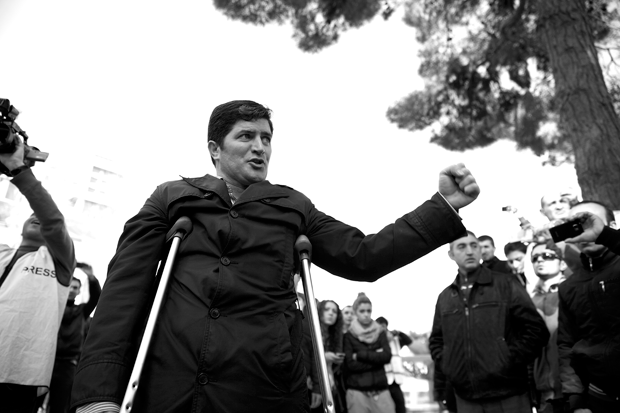
Fountain Square, Baku, 10 March 2013. A political activist during an unsanctioned demonstration protesting the deaths of military conscripts in non-combat situations. Authorities used excessive force to disperse the peaceful protest and detained more than 100 people. Photograph by Jahangir Yusif
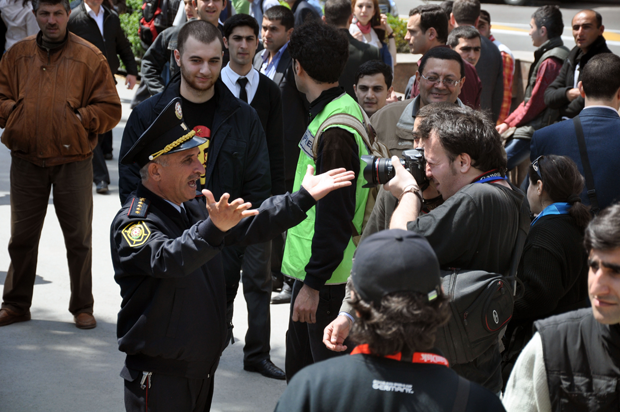
Sabir Park, Baku, 11 March 2011. During an unsanctioned political protest
in the wake of the Arab Spring, a police officer encourages journalists to take his photo. This was a rare move, which the photographer believes was intended to distract photographers from other aspects of the protest, such as police physically restraining protesters. Photograph by Mehman Huseynov
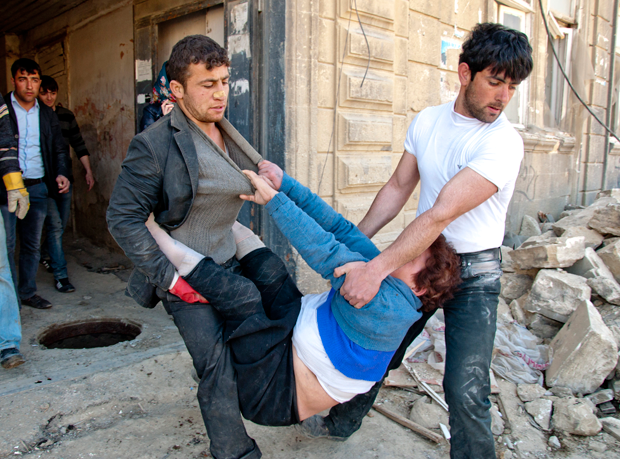
Shamsi Badalbayli Street, Baku, 2 April 2012. A resident is forcibly evicted from the area where the Winter Garden will be constructed. Approximately 300 complaints have been sent to the European Court of Human Rights related to forced evictions from this area. Photograph by Ahmed Muxtar
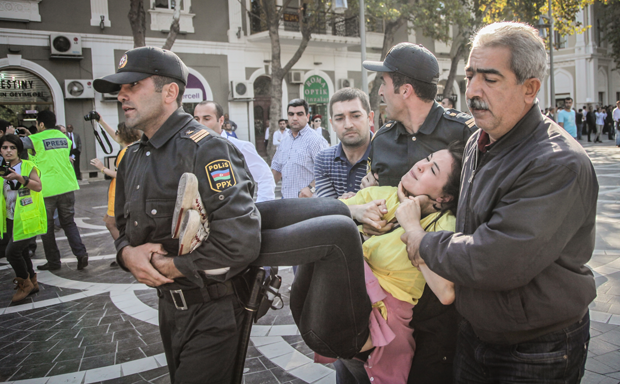
Fountain Square, Baku, 20 October 2012. Police detain a young opposition activist during an unsanctioned protest calling for parliament to be dissolved after a video was released showing an MP discussing the sale of parliamentary seats. Dozens of activists were detained during that protest. Photograph by Aziz Karimov
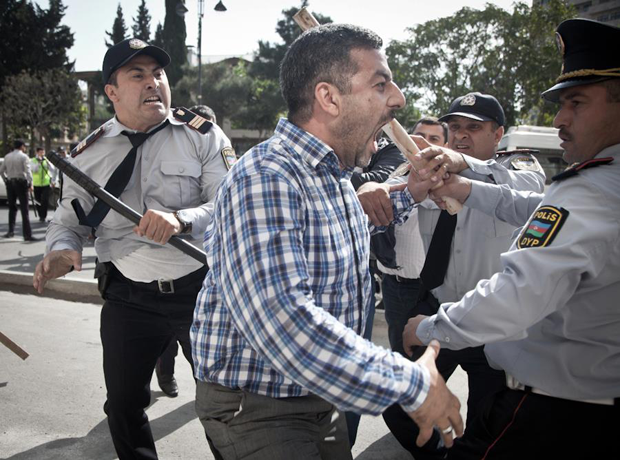
Hijab ban, 5 October 2013. Photograph by Aziz Karimov
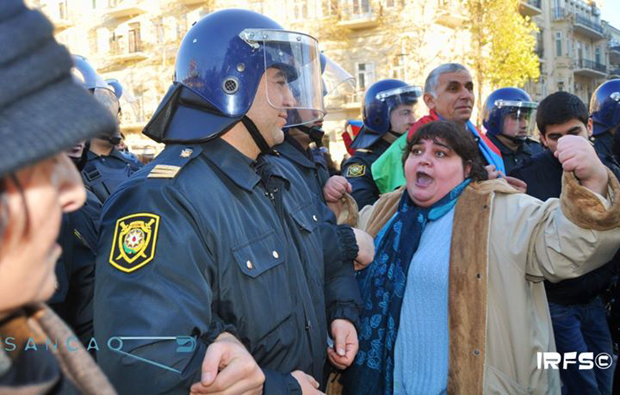
Investigative journalist Khadija Ismayilova confronts police. Photograph by Mehman Huseynov
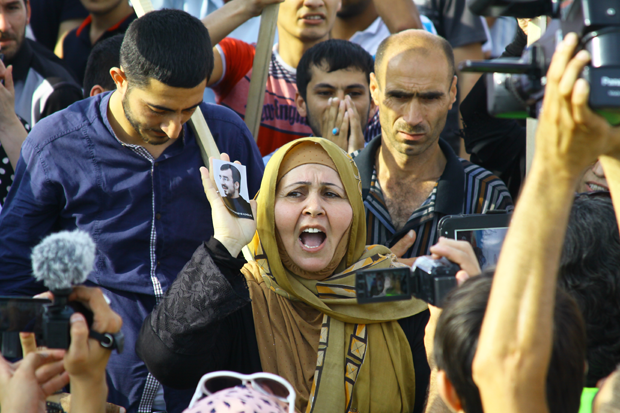
Nevreste Ibrahomova, head of Azerbaijan Islamic Party’s Women Council, holds the photo of an arrested Azerbaijani Islamist and chants freedom to him. Photograph by Shahla Sultanova
Photographers also face arrest and protracted legal action as a result of their work. Mehman Huseynov faces up to five years in prison on politically motivated hooliganism charges stemming from an altercation with a police officer during protests ahead of the Eurovision Song Contest in May 2012. The photographers featured in this story are among the few courageous individuals in Azerbaijan who remain willing to take on the risks associated with this work. They need international support and protection before they, too, become the subjects rather than the artists.”
Rasul Jafarov is the chairman of the Human Rights Club and project coordinator of the Art for Democracy Campaign. Rebecca Vincent is Art for Democracy’s advocacy director. She writes regularly on human rights issues in Azerbaijan
To find out more about the magazine and for subscription options, and read more about stories from the issue click here. These photographers will be part of an exhibition in London this winter. For more details, follow @art4democracy Join us to launch of Index on Censorship’s autumn issue on 15 October. To register for the event, click here.
![By Rama (Own work) [CC-BY-SA-2.0-fr (http://creativecommons.org/licenses/by-sa/2.0/fr/deed.en)], via Wikimedia Commons](https://www.indexoncensorship.org/wp-content/uploads/2014/11/2048px-Election_MG_3455.jpg)









